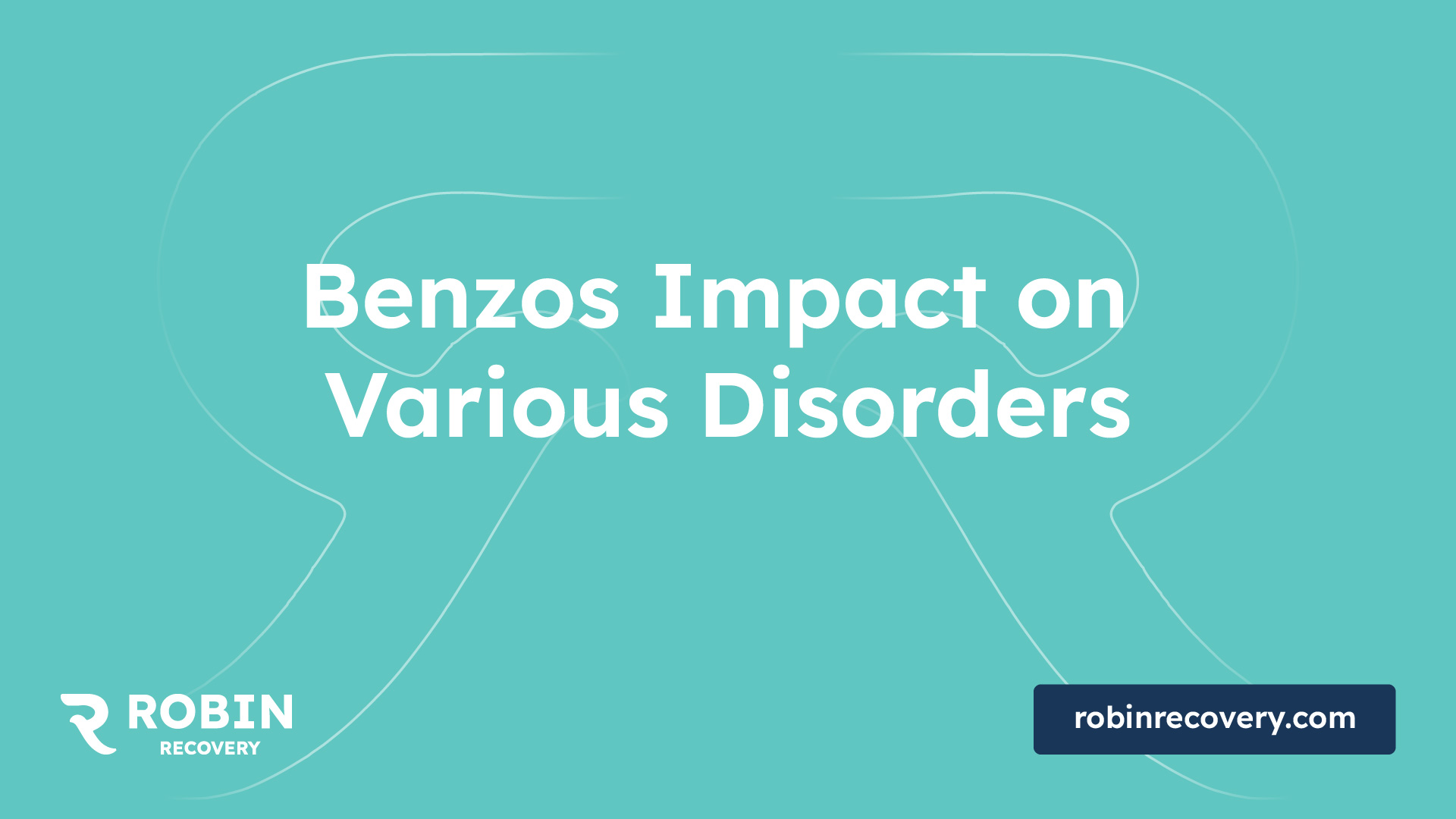Benzos Impact on Various Disorders

Disorders Treated by Benzodiazepines
Benzodiazepines are commonly prescribed for a variety of disorders, including anxiety and insomnia. This class of sedative-hypnotic medications plays a significant role in managing these conditions, which can impact the quality of life.

Anxiety Treatment
The U.S. Food & Drug Administration states that benzodiazepines are effective in treating anxiety disorders. They are particularly helpful for managing severe anxiety and panic disorders, especially when immediate relief is needed. Benzodiazepines work by enhancing the effects of gamma-aminobutyric acid (GABA) in the brain, which promotes feelings of calm and relaxation.
Individuals experiencing symptoms such as panic attacks, severe muscle tension, or situations requiring avoidance due to anxiety may benefit from these medications. In some treatment plans, benzodiazepines may be prescribed alongside selective serotonin reuptake inhibitors (SSRIs) to help manage initial side effects associated with SSRI use. This combination strategy is often designed to be short-term, tapering off benzodiazepines after a few weeks once the SSRIs take effect [2].
DisorderBenzodiazepines UsedTypical Symptoms AddressedAnxiety DisorderAlprazolam (Xanax), Lorazepam (Ativan)Panic attacks, muscle tension, insomnia
Insomnia Management
Benzodiazepines are also prescribed for managing insomnia, which is often connected to anxiety-related disorders. The sedative properties of benzodiazepines help individuals fall asleep faster and maintain sleep, thus, improving overall sleep quality. This medication may be particularly useful for those suffering from acute insomnia due to situational stress or anxiety.
While benzodiazepines can provide short-term relief for insomnia symptoms, they are typically not recommended for long-term use due to the risk of dependency. Alternative therapies and medications may be explored for ongoing sleep issues.
DisorderBenzodiazepines UsedCommon Symptoms AddressedInsomniaDiazepam (Valium), TemazepamDifficulty falling or staying asleep
In summary, benzodiazepines are effective for treating anxiety and insomnia but should be used with caution, particularly regarding long-term prescriptions and potential risks. For individuals seeking assistance with withdrawal symptoms from benzodiazepines, exploring types of holistic health practices may offer alternative pathways toward recovery.
Medical Conditions Addressed
Benzodiazepines, often referred to as "benzos," are widely used to treat various medical conditions. This section focuses on two critical areas where benzodiazepines play a significant role: seizure control and alcohol withdrawal relief.
Seizure Control
Benzodiazepines are effective in rapidly aborting convulsant activity in individuals with epilepsy or other seizure disorders. They work by enhancing the effect of gamma-aminobutyric acid (GABA), a neurotransmitter that reduces neuronal excitability throughout the nervous system [5]. This calming effect on the brain makes benzodiazepines a key option in managing seizures.
Type of BenzodiazepineTypical UseValium (Diazepam)Status EpilepticusAtivan (Lorazepam)Seizure ControlKlonopin (Clonazepam)Long-term seizure management
In emergencies, such as status epilepticus, benzodiazepines can be administered intravenously for immediate effect.
Alcohol Withdrawal Relief
Benzodiazepines are also crucial in managing alcohol withdrawal symptoms, which can range from mild anxiety to severe complications such as delirium tremens. They help stabilize patients during the withdrawal process by reducing anxiety and preventing seizures, which can occur in severe cases.
Withdrawal SymptomEffect of BenzodiazepinesAnxietyReduces anxiety levelsSeizuresPrevents seizure activityInsomniaAids in sleep
Benzodiazepines provide a bridge for patients undergoing detoxification, significantly improving their comfort and safety during the process. Many doctors closely monitor patients due to the potential for dependency and the need for a gradual tapering off once the withdrawal phase is over.
Understanding which disorders benzodiazepines treat aids both patients and healthcare providers in making informed choices regarding treatment options.
Overview of Benzodiazepines
Benzodiazepines, commonly referred to as benzos, are a class of medications used primarily for their sedative effects. They are widely prescribed for various disorders due to their ability to affect the nervous system.
Mechanism of Action
Benzodiazepines exert their effects by enhancing the activity of gamma-aminobutyric acid (GABA) in the brain. GABA is an inhibitory neurotransmitter that helps to calm the nervous system. When benzodiazepines are introduced, they facilitate the release of GABA, leading to reduced neural activity. This results in a calming effect that can alleviate symptoms associated with anxiety, insomnia, and other conditions.
The table below summarizes the primary functions of benzodiazepines:
EffectDescriptionSedationInduces a state of calm or sleepAnxiety ReliefReduces feelings of anxiety and tensionMuscle RelaxationEases muscle tension and spasmsSeizure ControlHelps manage and prevent seizuresAlcohol WithdrawalAids in alleviating withdrawal symptoms
For further details on the conditions treated, refer to the section on disorders treated by benzodiazepines.
Controlled Substance Classification
Benzodiazepines are classified as controlled substances due to their potential for misuse and dependence. The Controlled Substances Act categorizes them as Schedule IV drugs, which indicates that while they have medical value, they also carry risks of abuse and addiction. It is important for users to be aware of these risks and follow medical advice when using these medications.
Understanding the classification of benzodiazepines is crucial, as it impacts prescription practices and the regulations surrounding their use. For more insights on other commonly used medications, check our article on most commonly used drugs.
The combination of their mechanism of action and the safety regulations in place helps to outline the role that benzodiazepines play in treating anxiety, insomnia, and other disorders.
Commonly Prescribed Benzodiazepines
Benzodiazepines are frequently prescribed medications that treat various disorders. This section will look into the mainstream options and specific prescriptions that are commonly used to manage anxiety and other related conditions.
Mainstream Options
The most commonly prescribed benzodiazepines in the United States include:
BenzodiazepineBrand NamePrimary UsesAlprazolamXanaxAnxiety and panic disordersLorazepamAtivanAnxiety management and sedationClonazepamKlonopinAnxiety, panic disorders, and seizure controlDiazepamValiumAnxiety relief and muscle spasms
These options account for a significant portion of benzodiazepine prescriptions, as viewed from the studies conducted Cleveland Clinic. In Canada, similar options are widely prescribed for anxiety disorders, including bromazepam and oxazepam.
Specific Prescriptions
In addition to the mainstream options, certain benzodiazepines are specifically prescribed for distinct purposes. These include:
BenzodiazepinePrimary UseEstazolamInsomnia managementFlurazepamShort-term treatment for sleep disordersTemazepamSleep aid for insomniaTriazolamShort-acting treatment for insomniaMidazolamUsed for sedation in critical care and before anesthesia
Shorter-acting benzodiazepines like estazolam and temazepam are particularly useful for managing insomnia, offering benefits without lengthy residual effects. Understanding which disorders benzodiazepines treat can lead to more effective care and management strategies for individuals experiencing anxiety or sleep disturbances.
For more details on the impact and prevalence of these medications, refer to our article on most commonly used drugs.
Usage and Prescription Data
Understanding the prevalence and statistics related to benzodiazepine prescriptions provides insight into their impact on various disorders. This information highlights the significant role these medications play in healthcare.
Prevalence in the U.S.
Benzodiazepines are widely used in the United States, with a substantial number of individuals prescribed these medications. In a 12-month period spanning 2014 and 2015, an estimated 30.5 million people in the U.S. received prescriptions for benzodiazepines from healthcare providers [5]. This figure reflects the commonality of conditions treated with these drugs, such as anxiety and insomnia.
Prescription Statistics
Prescription statistics reveal the most commonly prescribed benzodiazepines and their prevalence among users. The following table outlines the key benzodiazepines prescribed in recent years:
BenzodiazepinePercentage of PrescriptionsAlprazolam (Xanax)66%Clonazepam (Klonopin)17%Diazepam (Valium)11%Lorazepam (Ativan)5%
These four medications together account for approximately 99% of benzodiazepine prescriptions. In 2009, these medications, particularly Alprazolam, zolpidem, clonazepam, and lorazepam, were among the most prescribed psychotropics, totaling around 150 million prescriptions that year.
The extensive use of benzodiazepines illustrates their significance in treating various conditions, leading many to ask, which disorders do benzos treat?. Understanding the prevalence and statistics helps shed light on both the usefulness and caution required in their prescribing practices.
Considerations and Potential Risks
When considering the use of benzodiazepines, it is essential to be aware of the potential risks associated with their long-term use as well as the implications of withdrawal and addiction.
Long-Term Use Effects
Long-term use of benzodiazepines can lead to significant health concerns. While these medications are effective for short-term treatment of anxiety and sleep disorders, prolonged use can result in a myriad of side effects, including drowsiness, dizziness, impaired coordination, and memory issues. In some cases, individuals may report improved sleep; however, objective evidence supporting this is lacking [8].
Benzodiazepine use is linked to cognitive decline and increased risk of accidents, particularly in older adults, where the risk of hip fractures increases significantly [8]. Additionally, patients maintaining long-term benzodiazepine therapy may experience a protracted withdrawal syndrome, which can last months and begin with as little as one month of daily use [8].
Long-Term EffectsPotential OutcomesCognitive DeclineMemory issues, impaired decision-makingPhysical RisksIncreased fall risk, hip fractures in older adultsWithdrawal SymptomsProtracted withdrawal syndrome
Withdrawal and Addiction Risks
The potential for addiction is a serious concern when using benzodiazepines. Patients can develop a tolerance, requiring higher doses to achieve the same effects, which increases the risk of overdose. Symptoms of overdose may include extreme drowsiness, confusion, and respiratory depression. When combined with opioids, the risk of severe sedation and overdose becomes even more pronounced [7].
Withdrawal from benzodiazepines can be challenging. Common withdrawal symptoms may begin after only a month of continuous use and can include anxiety, insomnia, and seizures in severe cases. Combining benzodiazepines with selective serotonin reuptake inhibitors (SSRIs) is sometimes considered, but any tapering off of benzodiazepines should be done cautiously under medical supervision.
Withdrawal EffectsDescriptionAnxietyIncreased feelings of anxiety upon discontinuationInsomniaDifficulty sleeping after cessationSeizuresIn severe cases, withdrawal can provoke seizures
Understanding these considerations is crucial for individuals seeking treatment options for anxiety or insomnia. Awareness of the risks associated with long-term use and the potential for addiction can help individuals and healthcare providers make informed choices regarding their treatment plans. Always consult a healthcare professional if you have questions regarding the usage of benzodiazepines or need guidance on managing their use.
References
[2]:
[3]:
[4]:
[5]:
[6]:
[7]:
[8]:
